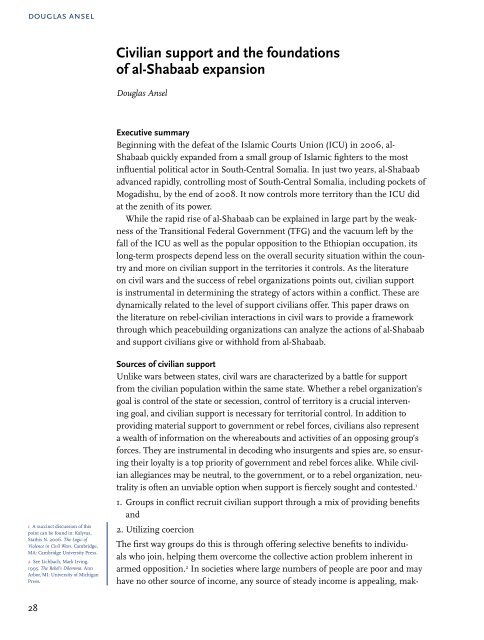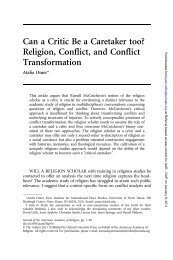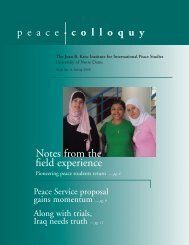Somalia: Creating Space for Fresh Approaches to Peacebuilding
Somalia: Creating Space for Fresh Approaches to Peacebuilding
Somalia: Creating Space for Fresh Approaches to Peacebuilding
You also want an ePaper? Increase the reach of your titles
YUMPU automatically turns print PDFs into web optimized ePapers that Google loves.
douglas ansel<br />
1 A succinct discussion of this<br />
point can be found in: Kalyvas,<br />
Stathis N. 2006. The Logic of<br />
Violence in Civil Wars. Cambridge,<br />
MA: Cambridge University Press.<br />
2 See Lichbach, Mark Irving.<br />
1995. The Rebel’s Dilemma. Ann<br />
Arbor, MI: University of Michigan<br />
Press.<br />
28<br />
Civilian support and the foundations<br />
of al-Shabaab expansion<br />
Douglas Ansel<br />
Executive summary<br />
Beginning with the defeat of the Islamic Courts Union (ICU) in 2006, al-<br />
Shabaab quickly expanded from a small group of Islamic fighters <strong>to</strong> the most<br />
influential political ac<strong>to</strong>r in South-Central <strong>Somalia</strong>. In just two years, al-Shabaab<br />
advanced rapidly, controlling most of South-Central <strong>Somalia</strong>, including pockets of<br />
Mogadishu, by the end of 2008. It now controls more terri<strong>to</strong>ry than the ICU did<br />
at the zenith of its power.<br />
While the rapid rise of al-Shabaab can be explained in large part by the weakness<br />
of the Transitional Federal Government (TFG) and the vacuum left by the<br />
fall of the ICU as well as the popular opposition <strong>to</strong> the Ethiopian occupation, its<br />
long-term prospects depend less on the overall security situation within the country<br />
and more on civilian support in the terri<strong>to</strong>ries it controls. As the literature<br />
on civil wars and the success of rebel organizations points out, civilian support<br />
is instrumental in determining the strategy of ac<strong>to</strong>rs within a conflict. These are<br />
dynamically related <strong>to</strong> the level of support civilians offer. This paper draws on<br />
the literature on rebel-civilian interactions in civil wars <strong>to</strong> provide a framework<br />
through which peacebuilding organizations can analyze the actions of al-Shabaab<br />
and support civilians give or withhold from al-Shabaab.<br />
Sources of civilian support<br />
Unlike wars between states, civil wars are characterized by a battle <strong>for</strong> support<br />
from the civilian population within the same state. Whether a rebel organization’s<br />
goal is control of the state or secession, control of terri<strong>to</strong>ry is a crucial intervening<br />
goal, and civilian support is necessary <strong>for</strong> terri<strong>to</strong>rial control. In addition <strong>to</strong><br />
providing material support <strong>to</strong> government or rebel <strong>for</strong>ces, civilians also represent<br />
a wealth of in<strong>for</strong>mation on the whereabouts and activities of an opposing group’s<br />
<strong>for</strong>ces. They are instrumental in decoding who insurgents and spies are, so ensuring<br />
their loyalty is a <strong>to</strong>p priority of government and rebel <strong>for</strong>ces alike. While civilian<br />
allegiances may be neutral, <strong>to</strong> the government, or <strong>to</strong> a rebel organization, neutrality<br />
is often an unviable option when support is fiercely sought and contested. 1<br />
1. Groups in conflict recruit civilian support through a mix of providing benefits<br />
and<br />
2. Utilizing coercion<br />
The first way groups do this is through offering selective benefits <strong>to</strong> individuals<br />
who join, helping them overcome the collective action problem inherent in<br />
armed opposition. 2 In societies where large numbers of people are poor and may<br />
have no other source of income, any source of steady income is appealing, mak-
















